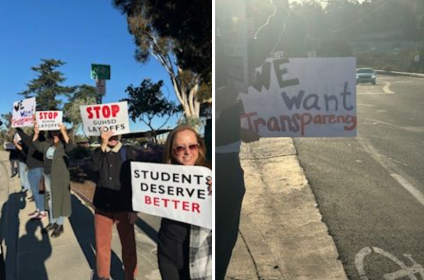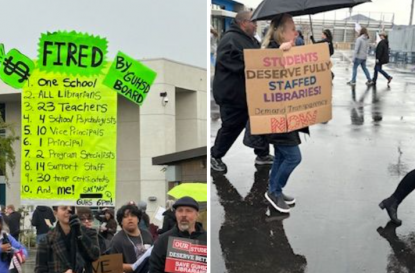By Alexander J. Schorr
Photo, left, via Grossmont Education Association: angry crowd turns back on Acting Superintendent Sandra Huezo and the GUHSD board
March 13, 2025 (El Cajon) – The Grossmont Union High School district staff and its students have been protesting the board majority’s controversial firings of teaching, librarian, and counseling positions in recent days, including student walk-outs, picketing at schools by parents and teachers, and a petition signed by more than 3,500 people opposed to the cuts. Opponents held a rally outside Wednesday night’s contentious board meeting, where 500 people filled the hall and every speaker criticized the board’s action. But their pleas fell on deaf ears, and the board chairman refused to allow a motion by trustee Chris Fite that would have reversed the vote authorizing the lay-offs.
 Image, right: GUHSD board announced various restrictions including requiring tickets for board meeting and threatening to “retreat” if the audience gets “rowdy.”
Image, right: GUHSD board announced various restrictions including requiring tickets for board meeting and threatening to “retreat” if the audience gets “rowdy.”
Parents picket schools, students walk out in protest
On the morning of Monday March 10, teachers and GEA representatives protested outside of nine school campuses: Grossmont, Monte Vista, Mount Miguel, Granite Hills, El Capitan, West Hills, Santanna, El Cajon Valley, and Valhalla High School. This is in the wake of the Governing Board’s decision to eliminate 64 jobs in the district: This includes 9 librarians, 23 teachers, 4 school psychologists, 10 vice principals, 1 principal, 2 program specialists, and 14 support staff. The board previously cut 30 temporary certificated employees earlier this year, which includes mental health counselors and A-G requirements counselors.

Photos by Alex Schorr: Left, teachers and Representatives holding signs to oncoming traffic in protest of the GUHSD Governing Board’s decision to terminate teaching, counseling, and librarian positions. Right: Protestor holds sign demanding transparency on the Board’s decision making.
GEA members and school staff such as counselors and teachers were picketing at these key school sites before the contracted day began; they did so on public property (on sidewalks and in the front and backs of these schools) facing traffic and public crossings. Morning walking shifts went from 7:45 a.m. to 9:10 a.m., leaving 5 minutes for members to get to class where students would arrive in 15 minutes.
Students also staged noon walk-outs on GUHSD campuses to protest the firings.
GEA has 950 members. The union plans to continue protests over student safety and education concerns related to the firings, as well as the welfare of those set to lose their jobs and those still employed, who may face larger class sizes and other challenges.

Photos by Alex Schorr: Left, GEA Representatives protest Board’s cuts on faculty. Right: Sign board expressing these concerns.)
One Grossmont High School Psychologist, Katy Abruzzo, had this to say regarding the board’s latest decisions to the cuts: “It’s really disappointing that the board is, it seems like, ignoring public opinion about the layoffs, that the layoffs aren’t necessary… and our students definitely deserve more, not less.” Additionally, she stated that the “public needs to understand that the board is laying off a large number of counselors. It’s not getting as much attention as the librarians, because they were temporary positions, but the number of counselors being laid off is high. At Grossmont High School, we’re losing two out of seven, and that’s a big impact on the services that our students will be receiving, so it would be helpful if the board reconsider those positions and letting us keep those so [that] we can continue to focus on student’s mental health.”
Kristen Lopprell, a Grossmont High School math teacher, gave her comments on the Governing Board’s decisions in cutting key roles in staffing across the district. “I am out here to advocate for students to get the best education possible, and that starts with the Governing Board, [which] makes actions in their interests, not behind closed doors, not without consulting all of the many people that work to make this district. If we need to make budget cuts, ask the people who know something. Parents… weren’t even asked about what would be the easiest thing for them to eliminate. I can tell you, it is not our school psychologists, our librarians, it’s not our counselors, we need those desperately. Things are feeling really eerie out there.”
For context, Lopprell was awarded California Teacher of the Year, receiving state commemoration for her work in Sacramento; the Governing Board neglected to invite her to celebrate her contributions to Grossmont High School due to their opposition to her personal orientation. She went on to say that “for someone in a minority group who feels attacked by my board, I am so grateful that people are waking up and showing up. Please, do your research and be aware. Things are not going well for students in Grossmont Union School District.”

Photos by Alex Schorr, left and right: at Valhalla High School, teachers and psychologists wave boards and banners protesting the board's cuts to key teaching and counseling positions.
GUHSD governing board meeting draws protest and angry crow
The next evening on Tuesday March 11, a GUHSD Governing Board meeting convened at Grossmont High School in the old gym, where elected officials and students, teachers, counselors, and librarians spoke on behalf of the cuts to the district's employment.
Speaker cards were available in person at 3:30 p.m. Attendees were given a ticket to guarantee a seat; no personal chairs or seating was permitted, and those present were told via a memo on Instagram and Facebook that there would be no sitting or standing on the floor, and that those who left the building for any reason would end up forfeiting their ticket. Unlike the previous GUHSD Board Meeting at El Cajon Valley High School, where approximately 600 people showed up at the meeting in protest of the board’s decision, only 500 people were allowed in the gym. Additionally, the flyer stated that the board would retreat for brief recesses if the crowd became “rowdy.” A link to the meeting was provided as well.

Photos by Alex Schorr: left and right: students, parents, teachers, and staff protest at GUHSD campuses.
At 3:45 p.m., people were allowed in and given a ticket for participation at the meeting. A call to order was made at 4:00 p.m. by Board President Gary Woods, PhD, who stated that the meeting would reconvene at 6:00 p.m. At about 5:00 p.m. protesters marched between the gym and the science building; many were students, parents, teachers, and librarians chanting "save our staff" and "serve our students."

Photos by Alex Schorr: left: protesters of budget layoffs of credentialed teaching and librarian positions rally outside in the rain by the Grossmont High School Old Gym. Right, protesters in the audience at the March 11 board meeting.
Those present in the auditorium included agitated parents, students, teachers, librarians, counselors, and Grossmont Education Association (GEA) union representatives from Grossmont, Monte Vista, West Hills, Valhalla, Granite Hills, Santana, Mount Miguel, and El Cajon Valley high schools. The audience roared "vote them out" and "shame on you" at 5:45 while applauding Chris Fite by name, the only trustee who voted against the cuts.
At 6:06 p.m. the meeting began. Superintendent Mike Fowler spoke on a video that was shown to the audience, displaying his concerns about "strength, stability, and continuity" with the Governing Board. He stated that he will end his tenure as Superintendent due to complications with pursuing health issues.
The Governing Board meeting at Grossmont High School is the latest in a continuous resolution of the Governing Board’s decision to terminate key teaching, counseling, and librarian positions; NBC 7 News lists that 49 accredited employee positions could be eliminated, including principals, vice principals, and psychologists, as well as an 11 classified school positions, such as support personnel.
The main focus of the meeting was for speakers to express their grievances about the indifferent cuts and layoffs to librarians, teachers, and counselors across the Grossmont school district, with many contending that the Board’s promoted budget cuts were fiscally irresponsible. There was a great deal of disrespect between both audience members and key figures of the Governing Board majority; slurs and chants demanding accountability and removal were hurled at the board members. Certain Governing Board members, particularly Jim Kelly, frequently ignored the audience by looking at his phone; trustee Robert Shield scolded the audience, hinting that he could be encouraged to be transparent if the proper respect was given.
The agenda covered the more general issues of the district budget moving forward, and was written in a way to exclude, not address the issue of layoffs that concerned the speakers. This caused great unrest and massive rebukes from the approximately 500 people present.
Zahara Nuristani, a student board member, and Jodi Hostetler, the Senior Executive Assistant, outlined the rules and procedures for speakers giving public comments. Each person who received a speaker card was given three minutes to speak within a given time frame of 40 minutes total. Each person was instructed to follow the agenda items which focused on the current budget. The meeting was divided into two parts by a recess in the middle of the presentation. GEA representatives, math teachers, alumni, librarians, English teachers, and parents from Granite Hills, Mount Miguel, Valhalla, and West Hills High School gave their condemnations of the board's refusal to retract the cuts from the budget moving forward.
Here is a sampling of the many public comments:
GEA President James Messina spoke about the impact of the firings and cuts which the board deliberated on in their previous meeting in February at El Cajon Valley High School, where the board voted 4 to 1 in favor of terminating and firing key teaching, counseling, and librarian positions across the Grossmont Unified School District. “Business services have not asked for these cuts,” Messina said. “The original revenue projected for 2024-2025 was $222 million, and we ended up getting over $380 million in revenue. That’s a big difference. This is why we use deficit spending to fill [in] any budget problems we have each year, then use the 30 to 40 certificated retirees we get at the end of the year to balance the budget going forward—that’s what Grossmont’s always done. This new process of layoffs first will create [a] whiplash effect with the firing and then hiring each year to match the new budget—it will destroy all longevity or progress that Grossmont made.” He went on to warn that these unpopular cuts could open up the possibilities of the Board being sued for personal damages and liabilities with a defund in school operations.
Valhalla High School Teacher Librarian Stephanie Macceca rebuked the board for an apparent lack of transparency with their constituents: “You haven’t been responding to the emails that you have been receiving.” An individual next to her stood up holding a pile of papers of alleged printed copies of these emails, much to the surprise and anxiety of the crowd. She went on to say that there were over 1300 copies. Referencing the board's concern for budget shortfall, Macceca said that the same $2.2 million short fall on the budget is not a deficit; this shortfall is a total that is projected for over three years.” Macceca stated that after a Covid pandemic-era staffing, saying that the board was preparing to reduce the library space at each school to “one employee running the entire space. This is not an example of overstaffing, this is an example of understaffing.”
Jay Steiger, a former GUHSD candidate and bond oversight committee chair, rebuked the board. “The district has more than enough money to cover its deficits, in fact, there is enough to cover these deficits for years to come,” he maintained, directly contradicting district claims. He added that cutting 49 teachers and numerous staff in the budget is “ridiculous. There are districts around the state which are in very difficult shape—Grossmont is not only not one of them. It is far, far, far away from anything approaching danger.” Steiger referenced a justification the board made for the cuts to save money, blame of the Los Angeles wildfires for potential state cuts in education funding. “The wildfires are not going to wreck [this] educational budget… What about preparing our students for the future?”
A parent and alumni of Grossmont High School lamented, “There’s no transparency in your hirings, in your firings, and it is already impacting our students. She emphasized that mental health positions, which the board was keen to cut, is an “honorable position,” and in emphasizing with other parents whose students could not show up, said that individuals like her were “making sure that their voices were being heard” for them.
A resident of La Mesa, who referenced having a decent education at Valhalla High School, and a passionate individual who derived values in the community of her church, stated the governing board “would have voters believe that they are righteous men. These men, who bring us lawsuits and lies, but these (referencing the audience) people are righteous…these people are educators, who protect and guide our children, they are the righteous.” With religious rhetoric, she asked the audience what they should do concerning “these men,” with people shouting “vote them out.”
A student named Molly from an unnamed school campus spoke, rebuking the perspective of Jim Kelly, Robert Shield, Scott Eckert, and Gary Woods concerning the priorities of the budget, saying that “elected officials are meant to serve not only the people who voted for them, but the populations they represent… Those people are telling you that this is a mistake. Listen.”

Photos by Alex Schorr: Left: printed copies of emails to the board. Right: the Governing Board members, from left to right, Chris Fite, Jim Kelly, Scott Eckert, Robert Shield, and Gary Woods.
El Capitan High School Associated Student Body President Darby Powers stated that “budget cut related layoffs…were counterproductive.” She referenced how a “bureaucratic position was created” which ”takes money that could be put towards credentialled staff salaries.” Powers emphasized the apparent hypocrisy facing the Governing Board where they claim to be concerned with the fiscal priorities of the Grossmont School District, while creating a new chief of staff position answerable to them directly, all while maintaining the taxing task of monitoring and addressing the needs of each position left open from the results of pink slips. She emphasized that in cutting key teaching and librarian positions, students in key language programs, who worked “hard for 12 years,” would be gone, and that students would be stripped away by “these unnecessary cuts.”
Many students present in the library referenced Suzanne Sanwald, a West Hills High School Librarian, and their love and gratitude for her help and care as a mentor and parent-figure in the lives of many students at West Hills. Concerning the budget, one student stated, “I’m not going to stand here and pretend like I have all the numbers because I don’t. But you know who would help me find those numbers? The staff and librarians!”
A parent representing a senior student at Mount Miguel High School added that “libraries and school programs were all critical to student’s success. We voted to improve these programs, not to have them taken away.” She referenced the large audience turnout, and the thousands of student walkouts from the major school campuses at places like Grossmont, Granite Hills, West Hills, Valhalla, and Monta Vista. She emphasized that these cuts “are the wrong types of cuts to make at the wrong time. For the budget, please reverse your votes.”
At 6:58 p.m. Sandra Huezo, the Acting Superintendent, spoke and referenced former Board Superintendent Mike Fowler’s contributions to the board. She also surmised that, according to the Governing Board’s summation, the layoffs and cuts to teaching, librarian, and counselor positions are key to the budget because these are “overstaffed.” She referenced that “other schools in other districts” had this problem, but did not specify any figures, or schools by name. She suggested that in addition to the cuts, “these students could be served by alternative programs,” which drew a fierce verbal backlash of “no” from the crowd.
In an earlier internal memo obtained by ECM, Huezo offered details on the district’s rationale behind the firing notifications issued, which she said were not fully explained at the last meeting due to disruptions. Huezo explained that the state requires school districts to submit budgets by June 30, even though the state’s budget including education funding isn’t finalized until late June. State law requires that district’s notify full-time employees earlier, by March 15 if their positions may be eliminated, with final notices required by May 15—before state budget funds are known. Her memo saidthat the GUHSD is projecting structural deficits in the future long-term, with enrollment declining and the Calif. Legislative Analyst projecting growing state budget deficits in coming years. The district currently employees over 200 more full-time positions than a decade ago, according to her memo.
Pearl Izuka, the Interim Deputy Superintendent of business and services, added that the budget “shortfalls would continue,” unless they cut staff from schools, though she did not provide any evidence.
The majority of the audience rose up in defiance of Huezo the Governing Board, with their backs facing trustees out of rejection of the board’s reasoning. At 7:43 p.m., Dr, Woods called for a 15-minute recess. Woods along with Eckert, Shield and Kelly exited through the back door with Hezo and Administrative Assistant Denise Broadfoot.
It is important to note that the budget, which was the focus of the meeting’s agenda, makes it very clear that while a revised graph projecting a decline in enrollment, their own budget states that they have a surplus: the original prediction for the 2024 to 2025 time frame was $282 million, with a determined amount of $308 million in revenue accounted for at the beginning of this year. The projected risks to the budget are defined as stock market vulnerability, elevated interest rates, natural disasters, and immigration.
As of February 6, 2025, the Governor's budget projects a $17 billion in surplus. The risks of inflation persisting, the slowing of interest rate reductions by the federal reserves, the presence of tariffs and alterations in immigration are highlighted as the main factors for financial downturn, not how many teachers, librarians, or counselors are present at key schools in the district. Both Huezo and Broadfoot illustrated this point, but emphasized the need to save more money “in case.”

Photos by Alex Schorr: Audience displays numerous protest signs.
At 7:57 the board reconvened.
Trustee Fite, who voted against the layoffs, spoke briefly concerning the priorities of the budget. He requested that the board rescind the February 27 vote to implement the layoffs and cancel the board-created chief of staff position.
Woods stated that because the layoffs were not listed in the agenda, it was “not the appropriate time to discuss” the layoffs.
Fite fired back, “it is overwhelmingly clear that the students realize that these cuts are a danger to their education… We are not a bank,” he added. “Taxpayers give us the money to educate their kids… We can have a structural deficit for years and we would still be fine” with the present reserves, he stated, then asked other board members directly, “If we are going to try to get the maximum of students that we lost from Covid, from online charters… how on earth are we going to get those people— these students, back if we can’t outperform the charter [schools]?”
Trustee Shield stated to an angry audience, “Chris Fite’s motions are out of order because they were not on the agenda.” He continued, “I would love to be transparent— I cannot be transparent if you don’t listen.”
Board President Woods stated that “positive expressions [of the board decisions] are welcomed, negative expressions will result in a time out.” He then insulted the audience, saying they behaved “like kindergarten students.” He later retracted and apologized for the comment he made
It is worth noting that under Senate Bill 1162, employers and the elected officials must consult their constituents on matters of employment and firings. It states, “Employees who understand how their pay is determined are more likely to feel valued and respected in their roles. This leads to greater job satisfaction, reduced turnover, and a more engaged workforce. Workers are less likely to feel resentful or uncertain when compensation is transparent and justified.” Additionally, “employers, in turn, can address concerns directly, creating a more transparent workplace culture.”
The board majority acknowledged the desire of the audience to preserve key positions and jobs that they would be laying off and terminating, and despite this, created a chief of staff position which critics say was done without proper vetting, advertisement, consent or acknowledgement of the public.
Several additional public speakers aired their views.
Mohammad, a senior from Mount Miguel High School who was originally involved in an engineering program, expressed his concern for the board’s budget layoffs of faculty. He said that his school’s “counselors, teachers, and librarians face pink slips instead of our appreciation, and we refuse to stay in silence while the people who make our schools what they are, get pushed out.” He made reference to how the library is a center for work and support, adding, “We are organizing, and we will not back down.”
A Grossmont High School representative who did not give his name reminded the board that when it comes to budgets, “When items disappear, they don’t come back… We know we’re not running out of libraries, but if there is no one to take care of them, it's going to be a place that people stop going to go… The kids have to know how to find the resources.” In a rare show of empathy with the board members, he said, “I understand it's hard when you sit there and while we berate you, but it is so hard to fathom that counselors, psychologists, librarians, would be cut from schools. That’s why everybody’s here.”
An alumni from West Hills noted that with the increased risk of students “being radicalized,” especially in the age of changing media literacy and social media, “our most vulnerable students are at risk.” He empathized that librarians make education more cohesive, and without them, “our community is less safe.”
At 9:01, there was a brief outburst from one of the individuals in the audience towards Jim Kelly to “get off your phone.”
A woman asked the Governing Board rhetorically how many schools in California have certificated librarians. “You are going to tell us that we are so poor, that no one in the district, in California, is so poor as us, that are so poorly structured as our district, that they have to eliminate librarians?” She accused the board of “being fooled into destroying education” in order to gentrify the education of future students with the directive of private charter or religious schools.
Granite Hills High School Site Learning Specialist Gavin Preston criticized the board’s transparency, stating that “not responding to the emails, public comments of your constituents and hiding behind closed sessions in emergency board meetings is a dereliction of your duties as elected and public officials.” Taking aim at Shield directly, she criticized him and the board majority for not listening or responding to the needs of their electors, concluding, “Clearly, we must speak louder.”
After the speakers finished, Dr, Woods adjoined the meeting at 9:12 and members left out the back door. No additional vote was cast on the matter of the budget or concerns of the faculty layoffs or cuts.
Despite the massive protests and obvious unpopularity of the Governing Board’s recent decisions, layoffs or pink slips must by state law be sent notifying employees by March 15 if their positions are at risk of elimination for the following school year; with final notices required by May 15.



 Image, right: GUHSD board announced various restrictions including requiring tickets for board meeting and threatening to “retreat” if the audience gets “rowdy.”
Image, right: GUHSD board announced various restrictions including requiring tickets for board meeting and threatening to “retreat” if the audience gets “rowdy.”





